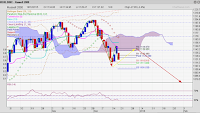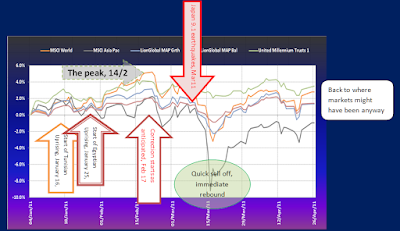A Nuclear Disaster = A Stock Market Disaster?
First,my apologies for moving the blog without providing immediate access details. MEA CULPA.
A 'SERIES OF UNFORTUNATE EVENTS'
A sequence of disturbing events is wearing out investor confidence: the devastating earthquake in Christchurch, alongside potentially destabilising yet 'liberating' political change in Tunisia and Egypt, then the hangup in Gaddafi land and finally (?) the triple whammy in Japan, a millennium earthquake, 13 meter tsunami, devastating people and country - and nuclear reactors in its path. That appeared to be the last straw for decision makers in faraway lands, who lost their cool and decided on throwing away their riskier holdings this Tuesday, driving global equity markets down sharply. Selling pressure then took over, with short coverings and computer programs coming into play, creating huge trading volumes on both sides of the Atlantic.
Last night the selling volume was 30% higher than usual but a -2% downside, = 'within expected ranges', in the US suggests that the selling is drying up and markets may now look to consolidate at suitable levels, - may be not quite were we are now, but not much lower: I guess we are talking of a 1-2% swing now in major markets, but more varied between regions and sectors.
Consensus? What Consensus?
Don't take it only from me. If you look around the media world, you hear a plethora of views, each basing theirs on some sort of considered outcome, now focusing almost exclusively on the nuclear disaster. The Euro Zones credit woes, the continuing bloddy rebellions in the Middle East are certainly out of the headlines. I cannot possibly judge whether these comments are reasonable, the assumptions practical or the conclusions wise and relevant. I am no nuclear expert, even less so if you wanted me to answer the question of how such a disaster might impact on the global economy per se. There are more intelligent write ups about this topic by colleagues at Legg Mason fund management and many others.
What I find astounding is that every one looks out for the worst case scenario, even fatalistically resorting to comments like "No-one can foresee the outcome" and "God only can help". Coming from a German nuclear expert, this is tantamount to blasphemy, do the same not normally attribute us Asians as being the fatalistic kind.
Apart from the fact that I rely on this help anyway, these commentators show little regard for the countless helpers and daredevils who do everything they can to prevent the worst from happening. Rather than helping, their (cheap) talk belittles the resolve and confidence of these obvious heroes of the moment! Viewed from this angle, the sellout in equity markets looks outright ridiculous. I now almost regret my earlier statement in which I defended financial decision makers as not being quite so gullible.
'CYCLICALS & ACTUALS'
As is customary, I also look for cyclical reason, support or resistance that may offer us more implicit insight than just guess work:
My research points to a substantial rebound imminently, retracing some 38% or even 50% of the total downside since February 7th. You might remember, this was the date when I called for profit taking. Our portfolios did that. We then saw equity valuations globally fall substantially (about -6%) into the third week of February. At that point we created a strategy of several steps to re-enter equities. All seemed to go according plan, till tragedy struck Japan. We had not even completed the final step of re-entry by then. That came this Monday and Tuesday, when markets in Japan started to reel.
Looking at our portfolios now can be somewhat disheartening, but the downside so far is still well within our stated parameters for safeguarding the portfolio, - with the exception of Japanese equity funds. I would rank the current events as exceptional as 9/11, the meltdown on Three Mile Island or Cernobil, which poured tons of acid rain on my beloved Back Forest, destroying a large portion of its trees. But substantial, lasting damage to stock markets did neither of these.
No matter where the markets are going in the very short term, we should realise that present valuations are very benign for purchasing and holding on to existing positions right now. Selling at this stage I would consider unwise, especially since re-entering the markets via the investment fund route would take the best part of 10 days.
Open Questions
What does the current correction tell us about the envisaged April market softness?
I am still thinking about it... Could it be that the profit taking was forced upon decision makers early, because of the nuclear meltdown threat? And would it mean that from now till then, markets are more likely trending sideways rather than up? Or will we see them going UP and then down again in a matter weeks? More controversially still, did the anticipated and much talked about correction for April come early, while April becomes the starting point for an early summer rally instead?
I will reassess the risk-reward for our holdings in a few days time, waiting for that -almost inevitable- rebound, starting latest by early next week. The size of the rebound will tell us what else is in store for April. Having said that, we will almost certainly increase our cash and bond positions again by the end of the month. In the meantime, don't mistake my short term bullishness as foolhardy: the fuse for more market upset has become extremely short. If markets do no turn around by next week, we will be preparing a proposal to exit recently taken positions, even while showing losses.
Until then, try show some patience - and respect that things might turn for the better sooner rather than later.



Comments